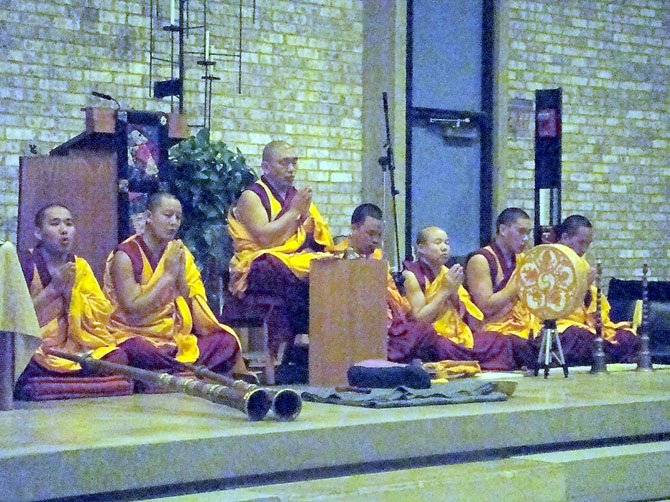Geshe Dr. Dorji Wangchuk and six monks from the Gaden Jangtse monastery recite a prayer for health at the Unitarian Universalist Church of Arlington on April 9. Photo by Montie Martin.
Arlington — The Gaden monks of Tibet ended their tour of Northern Virginia Monday, April 9 at the Unitarian Universalist Church of Arlington. The group concluded their visit with a 50-minute prayer for health, and a political message aimed at the plight of Tibetans who live under the governance of the People’s Republic of China.
"We are here to make a case for our independent country, to show our culture, plead to look at us and see what is going on," said Geshe Dr. Dorji Wangchuk, the group’s leader. "The situation is changing everyday. This is a difficult time, a scary time."
Since 2009, 34 Tibetans have ended their lives through the practice of self-immolation in protest of hardening Chinese rule in Tibet. Many of the Tibetans feel the double blow of losing their country as well as their culture, and attempt a dangerous crossing of the Himalayas to escape.
"We lost our country, now we lose our culture," said Wangchuk. "Sometimes young Tibetans cross mountains to escape, and so many of them have lost their lives. The lucky ones make it to India."
"Music is considered a sound offering, it will purify negative karma helping you lose negative emotions."
— Losang Tendrol, a senior monk with the Guhyasamia Center
On March 17, 1959, the 14th Dalai Lama fled Tibet in the face of a determined Chinese army. Today there are approximately 100,000 Tibetans who live in Dharamsala, India. The exiled community continues to advance peaceful ways to return to their homeland.
The Chinese government, however, maintains Tibetans were faced with a humanitarian crisis under the Buddhist system of governance. As the 50th anniversary of the flight of the Dalai Lama approached in 2009, Chinese authorities proclaimed March 28 to be "Serf Emancipation Day," a holiday that celebrates the arrival of the People’s Liberation Army, which is considered to have saved one million Tibetans from serfdom and slavery.
"They are just talking, it is just the opposite," said Wangchuk. "China is a large country and Tibet is small. They invaded because Tibet has many precious places, holy places."
This year China issued a commentary against the Dalai Lama. In a March 24 editorial carried by Xinhua News, China’s official media outlet, the Dalai Lama was equated as being on par with the worst of the Nazi offenders.
"You must deal with that kind of hatred through peace and truth, not fighting," said Wangchuk. "We are here to show you our truth."
It was with this need for healing, physically, spiritually and mentally, that the Gaden monks delivered their 50-minute recitation prayer.
"Education is very useful, share your culture, then suddenly there will be peace."
— Geshe Dr. Dorji Wangchuk, leader of the Gaden monks
Buddhist meditation groups meet every Monday at the Unitarian Universalist Church of Arlington at 4444 Arlington Blvd. Regular sessions include a 30-minute guided prayer, followed by a conversation about practice in every day life. For more information visit: uucava.org.
To support Geshe Dr. Dorji Wangchuk and the Gaden Tibetan monks, consider a donation to the not for profit Chokhor Gepel Ling center. Proceeds help fund the cultural tours of Tibetan monks, as well as facilities at the Gaden Jangtse monastery in India in order to accommodate the influx of monks from Tibet. Checks can be made out to Chokhor Gepel Ling Center, and sent to 3536 McLaughlin Ave., Los Angeles, CA, 90066. For more information visit: chokhor-gepel-ling.….
While the length of the prayer may seem long by western standards, it is considered to be the shortest version with only the inner core of verses.
"This is an aspect of the Buddha known for healing physical sickness, which are mental manifestations," said Losang Tendrol with the Guhyasamia Center, a Washington, D.C.-based community center that focuses on Tibetan Buddhism. "Music is considered a sound offering, it will purify negative karma helping you lose negative emotions."
While those unfamiliar with the Tibetan language might have found the monastic chants impossible to understand the words, the message was clear. Within the rhythms of the chant could be heard a recitation for peace of mind. Sprinkled throughout the chant were jarring bells, drums, horns and symbols meant as a further offering to the Buddha.
Regulars of the Monday evening Buddhist meditation sessions were quick to note the uniqueness of a group willing to share prayers and their culture.
"This is a great opportunity to sit with them and share prayer," said David Carlson, a professor of art at Marymount University who regularly attends Monday night meditations. "It’s a different script, a healing prayer. The energy channels wherever it needs to go, physical, spiritual, or mental."
As the Gaden monks emphasized, cultural exchange is the best way to support world peace. "World peace is something we need to do," said Wangchuk. "Education is very useful, share your culture, then suddenly there will be peace."
